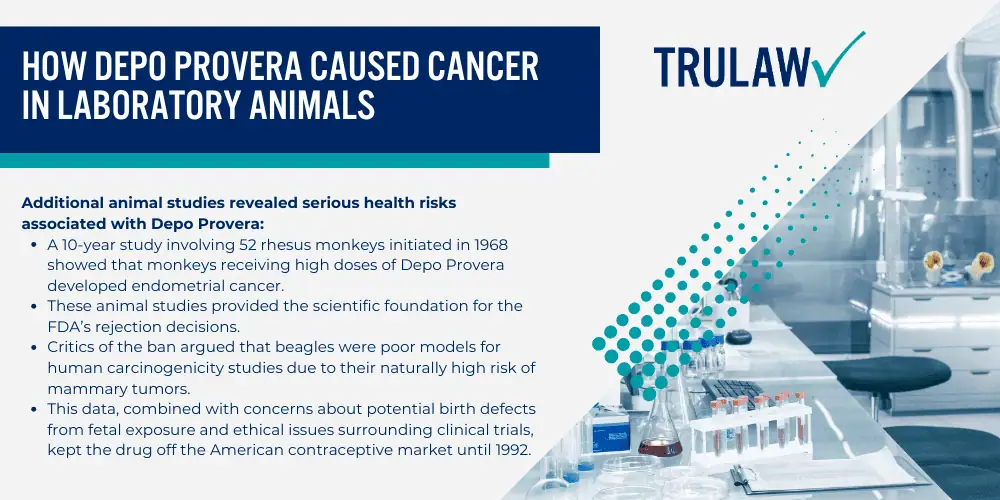The FDA’s repeated rejection of Depo Provera for contraceptive use between 1967 and 1983 represents one of the most contentious regulatory battles in pharmaceutical history.
Despite being available for non-contraceptive purposes in the United States since 1959 and approved as a contraceptive in numerous other countries by the 1970s, the FDA maintained its prohibition on Depo Provera shot use for birth control based on alarming safety data.

This decade-spanning prohibition occurred while the drug’s manufacturer, Upjohn Company, simultaneously conducted widespread testing on vulnerable populations internationally, creating a troubling dichotomy where Depo Provera patients in developing nations were exposed to a drug deemed too dangerous for American women by U.S. regulators according to findings from studies published in the Journal of the American Medical Association.
How Depo Provera Caused Cancer in Laboratory Animals
The pivotal evidence against Depo Provera came from laboratory studies where animals exposed to medroxyprogesterone acetate developed significant cancer risks.
When the drug was tested in 1973, FDA scientists noted that beagles receiving the drug demonstrated escalated risks of breast cancer, though they initially argued that the drug had such a “small patient population, that limited clinical trials with informed patient consent” would be permitted.
This hesitant stance hardened following more comprehensive results from the seven-year beagle study completed in 1975, which proved decisive in the 1978 rejection.

Additional animal studies revealed serious health risks associated with Depo Provera:
- A 10-year study involving 52 rhesus monkeys initiated in 1968 showed that monkeys receiving high doses of Depo Provera developed endometrial cancer.
- These animal studies provided the scientific foundation for the FDA’s rejection decisions.
- Critics of the ban argued that beagles were poor models for human carcinogenicity studies due to their naturally high risk of mammary tumors.
- This data, combined with concerns about potential birth defects from fetal exposure and ethical issues surrounding clinical trials, kept the drug off the American contraceptive market until 1992.
The eventual approval of Depo Provera in 1992 and the later development of Depo SubQ Provera (approved in 2004) followed decades of international use and further research that reconsidered the cancer risk data.
Safety concerns never fully dissipated, with the FDA requiring black box warnings about bone density loss for both formulations and recommendations against long-term use exceeding two years.
These persistent safety questions have fueled ongoing debate about whether regulators struck the appropriate balance between making effective contraceptive options available while adequately protecting Depo Provera patients from potential long-term health risks.
Failed Clinical Trials and Emerging Safety Concerns
The first application for Depo Provera’s approval as a contraceptive came in 1967, but by 1974, the FDA issued its initial rejection based on preliminary safety data.
This decision was solidified in 1978 following concerning results from a seven-year study involving 36 beagle dogs, where two animals developed malignant breast tumors after receiving the hormone injection.
The beagle studies were particularly significant because the breed had become the FDA’s standard animal model for testing drug safety following the thalidomide tragedy, making these findings difficult to dismiss.
The regulatory saga continued with a rare “Public Board of Inquiry” convened by the FDA in 1983, where gender and power dynamics played central roles in negotiations between scientists, physicians, patients, and advocacy groups.
Throughout this process, the National Women’s Health Network emerged as a formidable opponent to approval, raising pointed questions about both the drug’s safety profile and the ethics of testing practices that disproportionately targeted vulnerable populations.
Their objections highlighted fundamental concerns about informed consent and coercion in the clinical trials, particularly those conducted on poor women, rural women, and third-world women who often lacked access to alternative contraceptive options or complete information about potential risks.
If you or a loved one has suffered health problems after receiving Depo Provera injections, you may be eligible to seek compensation.
Contact TruLaw using the chat on this page to receive an instant case evaluation that can determine if you qualify for the Depo Provera Lawsuit today.



